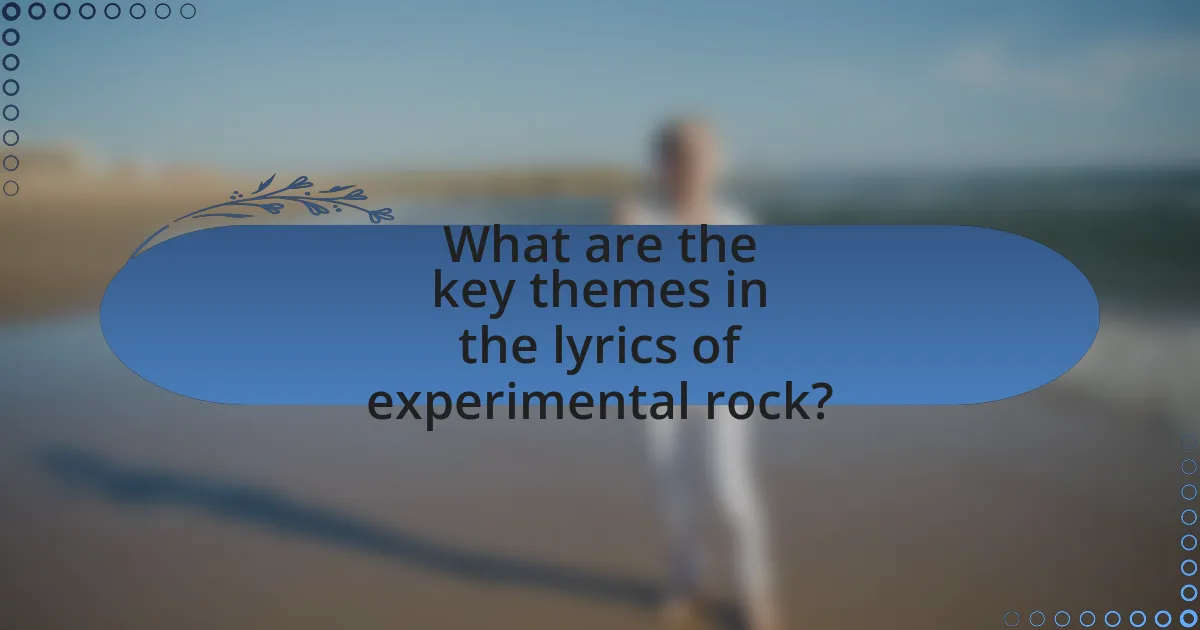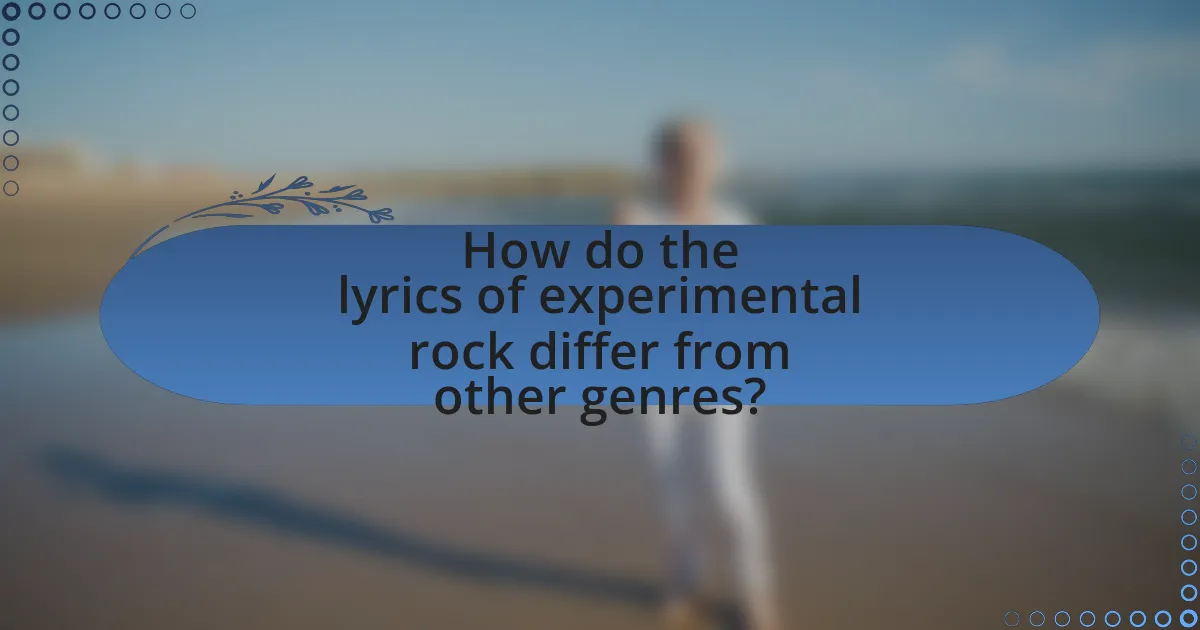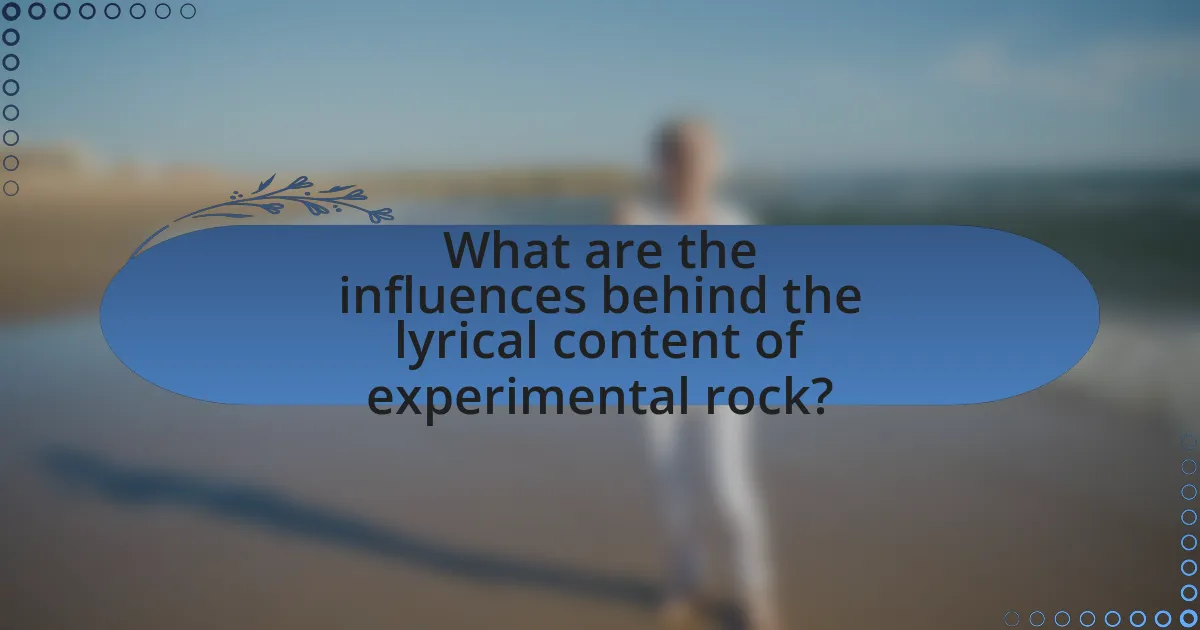The article focuses on analyzing the lyrics of experimental rock, highlighting key themes such as existentialism, surrealism, and social commentary. It examines how these themes reflect the cultural context of their time, influenced by historical events like the Vietnam War and the Civil Rights Movement. The article also explores the unique stylistic elements and narrative structures that differentiate experimental rock lyrics from mainstream genres, emphasizing the role of ambiguity and personal experiences in shaping lyrical content. Additionally, it discusses the impact of literary and artistic movements on the genre, as well as the significance of collaboration and experimentation in the creative process.

What are the key themes in the lyrics of experimental rock?
The key themes in the lyrics of experimental rock include existentialism, surrealism, and social commentary. Existentialism often explores the nature of existence and individual experience, reflecting feelings of alienation and questioning reality. Surrealism introduces dream-like imagery and abstract concepts, challenging conventional perceptions and evoking emotional responses. Social commentary addresses political and cultural issues, critiquing societal norms and injustices. These themes are evident in works by artists such as Frank Zappa and Radiohead, who utilize innovative lyrical structures and unconventional narratives to convey complex ideas and emotions.
How do these themes reflect the cultural context of their time?
The themes in experimental rock lyrics reflect the cultural context of their time by addressing social upheaval, technological change, and existential questioning prevalent during the 1960s and 1970s. For instance, the rise of counterculture movements, such as the anti-war protests and civil rights activism, is mirrored in lyrics that challenge authority and promote individual freedom. Additionally, the rapid advancement of technology and its impact on society is often explored through surreal imagery and abstract concepts in the music, illustrating the disorientation felt by many during this transformative period. This connection between themes and cultural context is evident in works by artists like Pink Floyd and Frank Zappa, whose lyrics encapsulate the anxieties and aspirations of their era, thereby validating the influence of the cultural landscape on their artistic expression.
What historical events influence the themes in experimental rock lyrics?
Historical events such as the Vietnam War, the Civil Rights Movement, and the counterculture of the 1960s significantly influence the themes in experimental rock lyrics. The Vietnam War, for instance, prompted artists to address themes of disillusionment and protest, as seen in songs like “Fortunate Son” by Creedence Clearwater Revival. The Civil Rights Movement inspired lyrics that focused on social justice and equality, with bands like Sly and the Family Stone incorporating these themes into their music. Additionally, the counterculture movement fostered a spirit of rebellion and exploration, leading to lyrics that challenged societal norms and embraced psychedelic experiences, exemplified by works from The Doors and Pink Floyd. These historical contexts provide a rich backdrop for the thematic exploration found in experimental rock.
How do societal changes shape the lyrical content of experimental rock?
Societal changes significantly shape the lyrical content of experimental rock by reflecting contemporary issues, cultural shifts, and collective sentiments. For instance, the rise of counterculture movements in the 1960s influenced bands like The Velvet Underground, whose lyrics addressed themes of alienation and social rebellion, mirroring the societal upheaval of the time. Additionally, the impact of technology and globalization in the 21st century has led artists like Radiohead to explore themes of disconnection and existential anxiety, resonating with listeners navigating a rapidly changing world. These examples illustrate how experimental rock serves as a medium for artists to comment on and critique the evolving social landscape, making the genre a powerful reflection of its time.
What common motifs can be found in experimental rock lyrics?
Common motifs found in experimental rock lyrics include existential themes, surreal imagery, and social commentary. Existential themes often explore the nature of reality and human experience, reflecting a sense of disillusionment or questioning of existence. Surreal imagery frequently employs abstract and dreamlike visuals, creating a sense of otherworldliness that challenges conventional perceptions. Social commentary addresses political and cultural issues, often critiquing societal norms and injustices. These motifs are prevalent in the works of artists like Frank Zappa and Radiohead, who utilize complex lyrical structures to convey deeper meanings and provoke thought.
How do motifs like surrealism and abstraction manifest in the lyrics?
Motifs like surrealism and abstraction manifest in the lyrics through vivid imagery, disjointed narratives, and unconventional structures. Surrealism is evident in the use of dream-like sequences and unexpected juxtapositions, which create a sense of altered reality, as seen in the works of artists like Pink Floyd and The Velvet Underground. Abstraction appears in the form of ambiguous language and fragmented thoughts, allowing listeners to interpret meanings subjectively, a technique utilized by bands such as Radiohead. These elements contribute to a rich, multi-layered lyrical experience that challenges traditional storytelling and engages the audience’s imagination.
What role do personal experiences play in the motifs of experimental rock?
Personal experiences significantly shape the motifs of experimental rock by infusing the genre with authenticity and emotional depth. Artists often draw from their own life events, struggles, and reflections, which leads to lyrics that resonate on a personal level with listeners. For instance, the use of abstract imagery and unconventional structures in songs allows musicians to convey complex emotions and narratives that reflect their unique experiences. This approach is evident in the works of artists like David Bowie and Radiohead, who have incorporated personal themes such as identity, alienation, and existentialism into their music, thereby creating a rich tapestry of motifs that engage audiences.

How do the lyrics of experimental rock differ from other genres?
The lyrics of experimental rock differ from other genres primarily in their abstractness and non-linear narrative structures. Unlike traditional rock or pop lyrics, which often focus on straightforward storytelling or emotional expression, experimental rock lyrics frequently employ surreal imagery, fragmented thoughts, and unconventional themes. This genre often challenges listeners with complex language and concepts, reflecting influences from avant-garde art and literature. For example, bands like Radiohead and The Mars Volta utilize cryptic lyrics that invite multiple interpretations, contrasting with the more direct and relatable lyrics found in mainstream genres. This distinct approach allows experimental rock to explore deeper philosophical and existential themes, setting it apart from more conventional musical forms.
What unique stylistic elements are present in experimental rock lyrics?
Experimental rock lyrics often feature unique stylistic elements such as non-linear narratives, abstract imagery, and unconventional structures. These elements allow for a departure from traditional songwriting, enabling artists to explore complex themes and emotions. For instance, the use of stream-of-consciousness writing creates a fluidity that mirrors the often unpredictable nature of the music itself. Additionally, the incorporation of surrealism and metaphor enhances the depth of the lyrics, inviting listeners to engage with the content on multiple levels. Bands like Pink Floyd and Radiohead exemplify these traits, using lyrics that challenge conventional storytelling and provoke thought, thereby solidifying their place within the genre.
How does the use of language in experimental rock challenge traditional songwriting?
The use of language in experimental rock challenges traditional songwriting by prioritizing abstract expression and non-linear narratives over conventional lyrical structures. Unlike traditional songwriting, which often adheres to verse-chorus formats and straightforward storytelling, experimental rock employs fragmented language, surreal imagery, and unconventional syntax to evoke emotions and provoke thought. For instance, artists like Captain Beefheart and Frank Zappa utilize complex wordplay and unexpected juxtapositions, which disrupt the listener’s expectations and encourage deeper interpretation. This approach not only expands the boundaries of lyrical content but also reflects the genre’s emphasis on artistic exploration and innovation.
What are the differences in narrative structure compared to mainstream rock?
Experimental rock often employs a non-linear narrative structure, contrasting with the more straightforward, verse-chorus format typical of mainstream rock. In experimental rock, narratives may be fragmented, abstract, or thematic rather than chronological, allowing for greater artistic expression and exploration of complex ideas. For example, albums like “The Dark Side of the Moon” by Pink Floyd utilize thematic continuity across tracks, while mainstream rock songs like “Sweet Child o’ Mine” by Guns N’ Roses follow a clear story arc. This divergence in narrative structure reflects the broader artistic goals of experimental rock, which prioritize innovation and emotional depth over commercial appeal.
Why is ambiguity a significant aspect of experimental rock lyrics?
Ambiguity is significant in experimental rock lyrics because it allows for multiple interpretations, enhancing the emotional and intellectual engagement of listeners. This genre often challenges conventional narrative structures, inviting audiences to explore personal meanings and connections. For instance, artists like David Bowie and Radiohead utilize ambiguous lyrics to provoke thought and evoke complex feelings, which can lead to varied listener experiences. The use of ambiguity in their work reflects broader themes of existentialism and surrealism, making the lyrics resonate on different levels and encouraging deeper analysis.
How does ambiguity enhance the listener’s experience of the music?
Ambiguity enhances the listener’s experience of music by allowing for multiple interpretations and emotional responses. This openness invites listeners to engage more deeply with the music, as they can project their own feelings and experiences onto the ambiguous elements. Research indicates that ambiguity in lyrics can stimulate cognitive engagement, prompting listeners to think critically about the meaning and context, which can lead to a more personalized and immersive experience. For example, in experimental rock, ambiguous lyrics often challenge conventional narratives, encouraging listeners to explore themes of identity and existentialism, thus enriching their overall connection to the music.
What are some examples of ambiguous lyrics in notable experimental rock songs?
Notable experimental rock songs often feature ambiguous lyrics that invite multiple interpretations. For instance, “The Sound of Silence” by Simon & Garfunkel presents vague imagery about communication and isolation, allowing listeners to derive personal meanings. Similarly, “Astronomy Domine” by Pink Floyd employs abstract references to space and time, creating a sense of disorientation and wonder. Another example is “Revolution 9” by The Beatles, which consists of fragmented audio and nonsensical phrases, challenging conventional narrative structures and leaving its meaning open to interpretation. These examples illustrate how ambiguity in lyrics can enhance the thematic depth of experimental rock music.

What are the influences behind the lyrical content of experimental rock?
The lyrical content of experimental rock is influenced by a variety of factors, including avant-garde art movements, literature, and personal experiences. Avant-garde movements, such as Dadaism and Surrealism, have shaped the abstract and often non-linear narrative styles found in the lyrics of many experimental rock artists. Additionally, literary influences from authors like William S. Burroughs and Jack Kerouac contribute to the stream-of-consciousness techniques and thematic explorations of identity and consciousness. Personal experiences, including social and political commentary, also play a significant role, as artists often draw from their own lives and societal observations to create thought-provoking and unconventional lyrics.
How do literary and artistic movements impact experimental rock lyrics?
Literary and artistic movements significantly influence experimental rock lyrics by introducing new themes, styles, and philosophical ideas. For instance, the Surrealist movement, with its emphasis on the unconscious and dream imagery, has inspired artists like The Velvet Underground, whose lyrics often explore abstract and non-linear narratives. Similarly, the Beat Generation’s focus on spontaneity and counterculture is reflected in the works of bands like The Doors, where poetic language and existential themes dominate the lyrics. These movements provide a rich context that encourages experimentation with language and form, leading to innovative lyrical content that challenges traditional songwriting conventions.
What connections exist between surrealism in literature and experimental rock lyrics?
Surrealism in literature and experimental rock lyrics share a connection through their exploration of the unconscious mind and dream-like imagery. Both forms utilize non-linear narratives and abstract concepts to challenge conventional perceptions of reality. For instance, surrealist writers like André Breton emphasized irrationality and juxtaposition, which parallels the lyrical style of experimental rock artists such as Frank Zappa and David Bowie, who often incorporate bizarre scenarios and unexpected shifts in tone. This alignment is evident in songs that evoke surreal landscapes or disjointed storytelling, reflecting the influence of surrealist techniques on the creative processes of these musicians.
How do visual arts influence the themes and motifs in experimental rock?
Visual arts significantly influence the themes and motifs in experimental rock by providing a rich visual context that complements and enhances the auditory experience. Artists often draw inspiration from visual elements such as surrealism, abstract expressionism, and pop art, which can manifest in lyrical content, album artwork, and live performances. For example, the use of vivid imagery and unconventional narratives in the lyrics of bands like Pink Floyd and The Velvet Underground reflects the influence of contemporary visual art movements. Additionally, the integration of multimedia elements in performances, such as projections and installations, creates a synesthetic experience that deepens the thematic exploration of identity, perception, and reality, as seen in the works of artists like Björk and Radiohead. This interplay between visual arts and music not only shapes the aesthetic but also invites listeners to engage with complex emotional and philosophical themes.
What role do collaboration and experimentation play in shaping lyrics?
Collaboration and experimentation are crucial in shaping lyrics, as they foster diverse perspectives and innovative ideas. In experimental rock, artists often work together, blending different musical styles and lyrical themes, which leads to unique expressions and narratives. For instance, the collaboration between David Bowie and Brian Eno resulted in the “Berlin Trilogy,” where their combined efforts produced groundbreaking lyrics that explored complex themes of identity and alienation. This synergy not only enhances creativity but also allows for the exploration of unconventional structures and concepts, ultimately enriching the lyrical content.
How do band dynamics influence the lyrical process in experimental rock?
Band dynamics significantly influence the lyrical process in experimental rock by shaping the collaborative environment in which lyrics are created. In experimental rock, the interplay between band members often leads to a fusion of diverse perspectives and ideas, which can result in innovative and unconventional lyrical themes. For instance, bands like Radiohead and The Mars Volta have demonstrated how internal relationships and creative tensions can inspire complex narratives and abstract concepts in their lyrics. This collaborative approach allows for a more fluid exchange of ideas, enabling members to challenge each other’s thoughts and push the boundaries of traditional songwriting. The resulting lyrics often reflect a collective consciousness, showcasing the unique contributions of each member while also embodying the band’s overall artistic vision.
What are some notable collaborations that have led to innovative lyrics?
Notable collaborations that have led to innovative lyrics include the partnership between David Bowie and Brian Eno, which resulted in the “Berlin Trilogy” albums, where they explored themes of alienation and identity through avant-garde lyrics. Another significant collaboration is between Thom Yorke of Radiohead and producer Nigel Godrich, particularly on the album “Kid A,” which introduced abstract and fragmented lyrical styles that challenged conventional songwriting. Additionally, the collaboration between Jim Morrison and Ray Manzarek of The Doors produced poetic and surreal lyrics that pushed the boundaries of rock music. These collaborations exemplify how artists can merge their creative visions to produce groundbreaking lyrical content.
What practical tips can enhance the analysis of experimental rock lyrics?
To enhance the analysis of experimental rock lyrics, focus on thematic exploration, contextual understanding, and lyrical structure. Thematic exploration involves identifying recurring motifs such as existentialism, surrealism, and social commentary, which are prevalent in experimental rock. Contextual understanding requires examining the historical and cultural background of the genre, as artists often draw inspiration from specific events or movements, such as the counterculture of the 1960s. Analyzing lyrical structure includes paying attention to unconventional formats, such as stream-of-consciousness writing or non-linear narratives, which can reveal deeper meanings. These methods are supported by studies that highlight the complexity and depth of experimental rock lyrics, demonstrating their significance in reflecting societal issues and personal experiences.